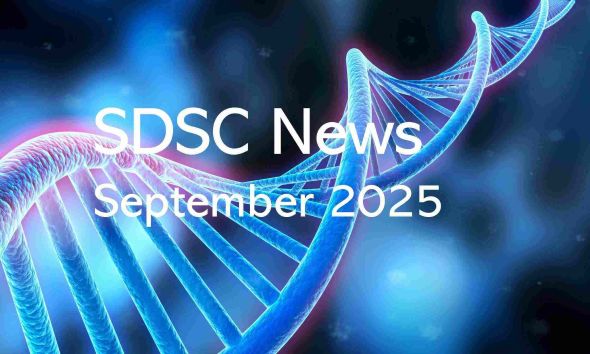Zurich, Switzerland. May 20, 2025 - In early May 2025, Eawag, the Swiss Federal Institute of Aquatic Science and Technology, hosted the ENRICH/SDSC Workshop on Interoperability of Environmental Data and AI. The event brought together more than 50 researchers from the four ETH Domain Research Institutes (Eawag, Empa, PSI, WSL), along with experts from the Swiss Data Science Center (SDSC), all engaged in applying data science and AI to environmental sciences.
The keynote talks emphasized how first-rate data infrastructures like those of Copernicus and swisstopo are key to advancing the AI transformation of research and services monitoring and predicting changes in the environment, climate, and Earth systems. Short talks illustrated the diversity of efforts from data collection and sharing to AI-based projects in the four Research Institutes (RIs). In the afternoon, the brainstorming workshops clarified some of the most pressing data infrastructure needs to facilitate the development of AI for environmental sciences in Switzerland.
Connecting the Bigger Picture: Innovation in Environmental Data Science
In his opening address, Prof. Dr. Martin Ackermann, Director of Eawag and member of the ETH Board, emphasized the growing importance of collaboration across the four Research Institutes. Aligned with the ETH Domain’s Fit for Future initiative, the ENRICH/SDSC workshop showcased how cross-institutional synergies can drive the impact of data science in tackling environmental challenges. The ENRICH initiative was highlighted as a key enabler in coordinating complementary research and advancing sustainability goals which is especially crucial as valuable environmental datasets face increasing risk.
Keynote speakers underscored this vision: Dr. Philipp Jörg, Head of Image Data and Crisis Information at swisstopo, the Federal Office of Topography, spoke on geodata for environmental monitoring and showcased critical tasks in his department when facing recovery from natural hazards; Dr. Richard Engelen, Deputy Head of the Copernicus Atmosphere Monitoring Service (CAMS) at ECMWF, introduced Copernicus data services for research and AI, and how to build data foundations for multiple downstream tasks; and Dr. Sven Kotlarski, Team leader Climate Development at MeteoSwiss, discussed how downscaling climate scenarios are crucial for both scientists and decision makers.
Dr. Michele Volpi, Lead Data Scientist at SDSC, presented how one-third of SDSC’s projects today address environment and climate sciences in general, featuring innovative and fast-paced collaborations such as DNAi and examples in Natural Hazards, namely DEAPSnow, Climis4Aval, DATSSFLOW, and the EAGLE projects. Prof. Dr. Guillaume Obozinski, Chief Data Scientist and Deputy Executive Director at SDSC, further outlined how SDSC’s role as a National Research Infrastructure creates new avenues for collaboration and impact, and advertised the upcoming National Call for collaborative projects in September 2025 offering a timely opportunity for joint digital and AI-driven environmental initiatives.
Workshops reveal shared needs and addressable action
Four brainstorming workshops—covering climate impact and natural hazards, ecology and biodiversity, hydrology and cryosphere, and natural resources and pollution—identified overlapping and specific priorities in environmental sciences around data needs, interoperability challenges, and opportunities for collaborative AI modeling.
The workshops revealed a shared need for facilitated access to reliable, well-structured datasets, particularly those capturing extremes, long-term trends, and complex systems, to support both scientific research and AI-based environmental modeling. Participants emphasized the importance of centralized, user-friendly platforms with standardized formats, clear metadata, and integration capabilities to support both data users and deliverers.
Key take-aways:
- The workshops highlighted a clear need across domains for enhanced access to and interoperability of key environmental data sources.
- Creating interoperability platforms that integrate existing repositories—rather than replacing them— seems to be the right approach as it could significantly increase the usability of existing data.
- Research Data Infrastructures (RDIs), as defined by the National ORD Strategy Council, providing not only access to data, but also tools for data discovery and meta-data queries, data harmonization and quality control, and supporting the development and sharing of code within a community seem to match well many of the expressed needs.
- This type of infrastructure should be beneficial not only to make existing data more accessible but remove barriers and increase the engagement of communities to contribute data as well.
- The question of maintenance, hosting and long-term sustainability of data sources and platforms remains a challenge. While the SDSC can contribute to put in place elements of infrastructure supporting these, the ownership, operation and governance should remain under the responsibility of the right institutions.
About the Swiss Data Science Center (SDSC)
The Swiss Data Science Center (SDSC) is a national research infrastructure in data science and artificial intelligence (AI). Its mission—to enable data-driven science and innovation for societal impact—drives its initiatives in research projects, knowledge and technology transfer, and education. With a large multidisciplinary team of professionals in Lausanne, Zurich and Villigen, the SDSC provides data science and AI expertise and services to various domains, such as health and biomedical sciences, energy and sustainability, climate and environment, and large-scale scientific infrastructures. The SDSC also contributes to initial, continuing and executive education programs at EPFL and ETH Zurich. For more information please visit: www.datascience.ch
For more information, please contact:
Uta Ünal, Head of Communications
uta.uenal@sdsc.ethz.ch
Catherine Hugon, Head of Executive Affairs
catherine.hugon@epfl.ch







